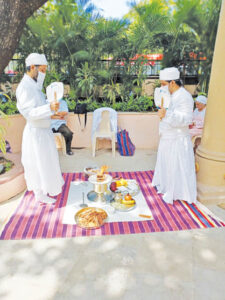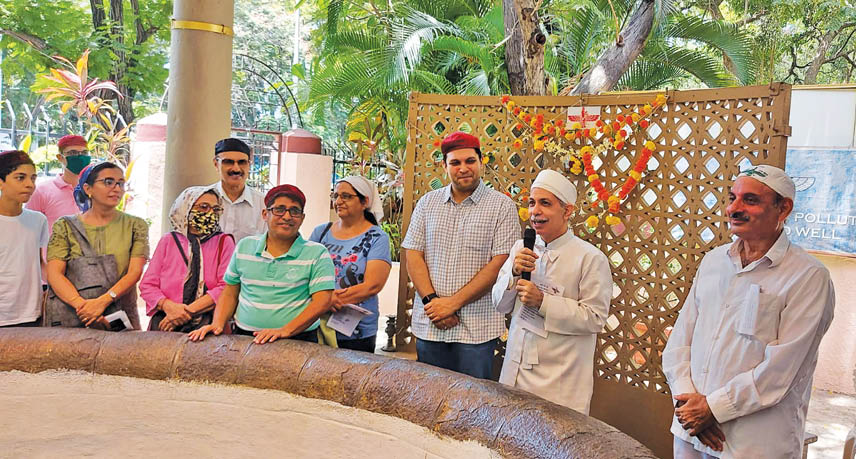 Continuing with the pre and post-pandemic tradition of holding the monthly Ava Roj Jashan and Humbandagi at the Bhikha Behram Well, on 22nd May, 2022, Ava Roj (Dae Mahino), a Jashan was held at the Bhikha Behram Well at 10:30am, followed by a Humbandagi.
Continuing with the pre and post-pandemic tradition of holding the monthly Ava Roj Jashan and Humbandagi at the Bhikha Behram Well, on 22nd May, 2022, Ava Roj (Dae Mahino), a Jashan was held at the Bhikha Behram Well at 10:30am, followed by a Humbandagi.
Erudite priest, educator and scholar, Er. Dr. Ramiyar Karanjia shared a powerful talk on the importance of the Navjote ceremony in the lives of Zoroastrians. He shared how religion was fundamental to life, and if one followed his religion correctly, he would undoubtedly become ‘Happy, Strong and Confident’, thus allegorically earning the ‘HSC’ degree.
“An integral aspect of Zoroastrian religion is the Navjote ritual. In fact, it is the one thing that is definite in a Parsi / Irani Zarthosti’s life. Our Iranian brothers refer to it as Sudreh-pushi. This is the most important event in a Zarthoshti’s life.
The word Navjote means ‘a new person offering prayer’. Navjote is a very lofty ritual. That’s why it starts with the Nahn, proceeds with the giving of the Sadra by a respected priest, the child taking the solemn vows of the religion, followed by the first assisted Kasti and finally, by the blessings of the priest, is formally ingrained into the religion.
The age of the Navjot, between 6 complete and 9 complete is because at that time, the child comes of the age of taking responsibility for the actions. It is pre-puberty. Navjot is a life-long commitment and that’s why the age is when the child should understand this responsibility.
3 important things happen at the time of Navjot – First: Receiving the gift of Sadra Kasti – prepares the child as a new offerer of prayer; Second: Connection with Prophet Zarathushtra, established by the actions of the priest; and Third: Vow for life-long relationship with God, our prophet and religion, taken by the child in the Din-no-Kalmo prayer.
To make the above three things easy to remember, I have embedded them in the word Navjote itself – ‘NA’ – New prayee, with the responsibility of daily offering prayers; ‘VA’ – Vows of the religion, which one has to always remember through life; and ‘J(ot)’ – Joining with prophet Zarathushtra, Ahura Mazda and Mazdayasni religion.
Any religious work starts with a Kasti – this 3-4 minute ritual has the power to permanently change our life for the better!”
- કેવો સુંદર જવાબ! - 29 March2025
- પારસી સન્નારીઓ તેમના જાદુઈ સ્પર્શ સાથે બની સુરત મેરિયોટ અથવા લાઇન્સના રસોડાની રાણીઓ - 29 March2025
- મોબેદ મેહરાબાન ફિરોઝગરીનું અવસાન - 29 March2025
